On & Off the Hill
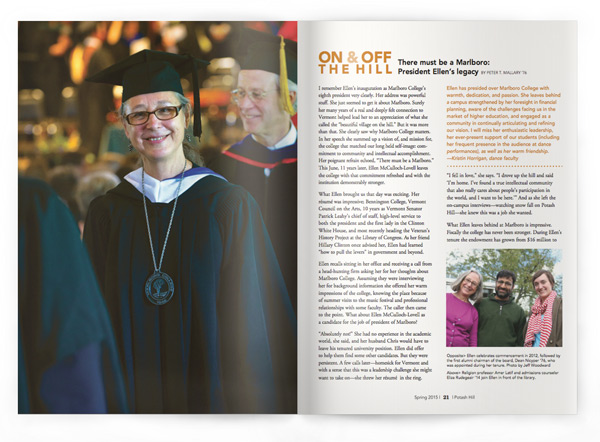
There must be a Marlboro: President Ellen’s legacy
By Peter T. Mallary ’76
I remember Ellen’s inauguration as Marlboro College’s eighth president very clearly. Her address was powerful stuff. She just seemed to get it about Marlboro. Surely her many years of a real and deeply felt connection to Vermont helped lead her to an appreciation of what she called the “beautiful village on the hill.” But it was more than that. She clearly saw why Marlboro College matters. In her speech she summed up a vision of, and mission for, the college that matched our long held self-image: commitment to community and intellectual accomplishment. Her poignant refrain echoed, “There must be a Marlboro.” This June, 11 years later, Ellen McCulloch-Lovell leaves the college with that commitment refreshed and with the institution demonstrably stronger.
What Ellen brought us that day was exciting. Her résumé was impressive; Bennington College, Vermont Council on the Arts, 10 years as Vermont Senator Patrick Leahy’s chief of staff, high-level service to both the president and the first lady in the Clinton White House, and most recently heading the Veteran’s History Project at the Library of Congress. As her friend Hillary Clinton once advised her, Ellen had learned “how to pull the levers” in government and beyond.
Ellen recalls sitting in her office and receiving a call from a head-hunting firm asking her for her thoughts about Marlboro College. Assuming they were interviewing her for background information she offered her warm impressions of the college, knowing the place because of summer visits to the music festival and professional relationships with some faculty. The caller then came to the point. What about Ellen McCulloch-Lovell as a candidate for the job of president of Marlboro?
“Absolutely not!” She had no experience in the academic world, she said, and her husband Chris would have to leave his tenured university position. Ellen did offer to help them find some other candidates. But they were persistent. A few calls later—homesick for Vermont and with a sense that this was a leadership challenge she might want to take on—she threw her résumé in the ring.
Ellen has presided over Marlboro College with warmth, dedication, and passion. She leaves behind a campus strengthened by her foresight in financial planning, aware of the challenges facing us in the market of higher education, and engaged as a community in continually articulating and refining our vision. I will miss her enthusiastic leadership, her ever-present support of our students (including her frequent presence in the audience at dance performances), as well as her warm friendship.
—Kristin Horrigan, dance faculty
“I fell in love,” she says. “I drove up the hill and said ‘I’m home. I’ve found a true intellectual community that also really cares about people’s participation in the world, and I want to be here.’” And as she left the on-campus interviews—watching snow fall on Potash Hill—she knew this was a job she wanted.
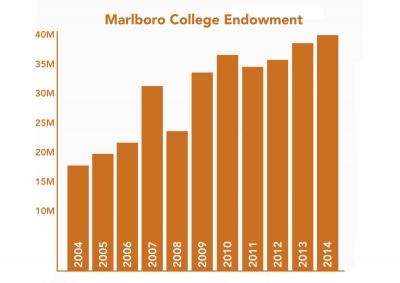 What Ellen leaves behind at Marlboro is impressive. Fiscally the college has never been stronger. During Ellen’s tenure the endowment has grown from $16 million to more than $40 million (see chart right). The endowment per student meets the highest national standards. It also leaves the college with the ability to commit substantial resources to broadcasting Marlboro’s unique story far afield. All this has been accomplished in spite of international economic trauma. Though she is quick to give her predecessors credit for building an endowment foundation, there is no question that this president has brought special skills to the art of donor relations and fundraising in general. She has a gift for telling the college’s story—and convincing people that they want to be a part of that story.
What Ellen leaves behind at Marlboro is impressive. Fiscally the college has never been stronger. During Ellen’s tenure the endowment has grown from $16 million to more than $40 million (see chart right). The endowment per student meets the highest national standards. It also leaves the college with the ability to commit substantial resources to broadcasting Marlboro’s unique story far afield. All this has been accomplished in spite of international economic trauma. Though she is quick to give her predecessors credit for building an endowment foundation, there is no question that this president has brought special skills to the art of donor relations and fundraising in general. She has a gift for telling the college’s story—and convincing people that they want to be a part of that story.
I knew from the start that Ellen would bring uncommon grace, clarity, and collegiality to Marlboro. Throughout, she has been a champion of the college and a true friend to the community, near and far, celebrating with us our core mission and accomplishments and inspiring confidence in Marlboro’s future.
—Jim Tober, retired economics faculty
Academically, as well, the college has never been stronger. When Ellen arrived, she saw a number of challenges. A generation of senior faculty was about to retire without a proper retirement program in place. There was also a need to increase faculty salaries. So she raised $12 million to endow the Fund for Inspired Teaching, designed to address these issues. And new faculty came, mentored by long-serving faculty and staff.
“We have very strong new faculty who are really embracing the Marlboro model of student-driven learning and working across disciplines. When a faculty member says—as they typically do at Marlboro—‘my students are my colleagues,’ that’s very unusual in higher education. They set very high expectations that students want to meet. We have to continue to advocate for and explain our model; we open students’ minds to other ways of learning and the expanse of discovery.” As she leaves, Ellen is establishing the President’s Fund for Marlboro’s Future in order to further recognize and endow the faculty and staff’s commitment to the Marlboro model— personal, intensive, and demanding.
The future of the graduate and professional studies program has been a particular focus of Ellen’s, as she worked to build a bridge between the graduate and undergraduate campuses both practically and philosophically. She launched the program in nonprofit management, which now includes certificate and master’s programs, leadership and board training.
For me, Ellen’s legacy will be the many instances over the past ten years where she modeled a remarkable ability for deep listening and attentiveness to the many different and, at times, competing voices within our community.
—Amer Latif, religion faculty
“The graduate center provides a way to expand our offerings for working adults, using a hybrid model that blends intensive, in-person residency with online learning. The programs have evolved closer to the heart of the college on the hill: we are one college serving many kinds of students.” A growing number of undergraduate students have gone on to earn professional certificates or master’s degrees through the graduate and professional studies programs. “It has also been a great opportunity for a higher profile in the region.”
Ellen talks about some of the things that surprised her about the job. One has been her interest in the physical plant and the appearance of the campus, both on the hill and downtown.
“One of the things people always remark about Marlboro College is that it is beautiful. I often describe it as a New England hill village. It’s an apt metaphor, with our Town Meeting and our smallness and our interdependence. It goes to the core of Marlboro’s identity. It has given me very deep pleasure to make it more beautiful.”
Remarkable strides have been made in the past decade. Early in her tenure, Ellen had the pleasure of presiding over the dedication of the Serkin Center for the Performing Arts. In 2006 the Gib Taylor metalworking studio opened, and in 2008 the Total Health Center. In 2011 the core of the campus received a landscaping makeover, and in 2012 the community greenhouse opened, followed by new classroom spaces downtown.
Ellen has added 114 acres and two other buildings to the undergraduate campus in her time here. As she prepares to leave, ground has been broken for the Snyder Center for the Visual Arts, scheduled to open this fall. Her personal vision and fundraising fingerprints are all over most of these projects—just further examples of the network of support for the college that she has built, with “lots of help from others.” Those others include the Marlboro Music School and Festival, based on the undergraduate campus in the summer, a relationship that Ellen has treasured.
Another surprise Ellen notes is how much she came to care about the students, and how much she worried about them.
“I didn’t realize how powerful it would be, watching their struggles and their triumphs. I can’t keep them safe, and I can’t make sure they always make the right decisions, but I want them to have the tools to make good decisions and to have good lives.”
My fondest memories are of Ellen’s personal commitment to Marlboro—a kind word in times of joy and sorrow, her gracious presence in a senior oral, and her ready acceptance of my spontaneous request to read a poem in an Environmental Studies class session for accepted students.
—Jenny Ramstetter, biology faculty
There have been storms to weather—literally. Ellen recalls the night of the 2008 ice storm, when the woods around the president’s house rang with cracks that “sounded like rifles” as trees and limbs fell. That morning Ellen was one of just a few people able to get to campus. She opened the kitchen and ended up flipping pancakes, enlisting students to help.
“We were two and a half days with no power. Nearby faculty and staff walked to campus to help. Dan Cotter and his crew moved generators from building to building.” Ellen recalls the resilience of the students as the power outages went on, finally leading to their being sent home early for the December holidays.
Following that storm, a generous donor provided funds for a generator to cover parts of the center of campus, and Ellen would need it. In 2011 Tropical Storm Irene brought high winds and rain—11 inches in 24 hours. Roads washed out, and the campus was cut off for three days.
“We had new students back from their Bridges orientation trips. The sense of isolation was really extreme. Keeping everybody fed was a challenge. But the community was once again resilient. We ate a lot of rice and beans.”

Ellen has taken an active interest in every area of the college: all of its curriculum, all of the many faculty and staff hires, its alumni, friends, and donors, the Outdoor Program, Town Meeting, long range planning, and current culture. The energy she has brought to all of this is humbling not just because of how hard it is but because of the sincerity of her concern for all these activities and constituencies.
—Tim Segar, visual arts faculty
Ellen has tackled other crises as well. Perhaps most importantly she has become a national champion of the liberal arts, seeking and achieving a high profile concerning the widespread challenge to what one faculty member calls “the liberating arts.” There has been a lot of debate and a lot of pressure from the White House on down, especially now with greater vocational focus and the monetization of the value of higher education.
“It can be very hard to struggle against the trend—to stand up for liberal education, the broad knowledge and academic skills that the Plan of Concentration is all about. How do we adapt, and how do we fight? How do we continue to present our strengths? I am committed more strongly than ever to finding these answers. I believe in a liberal arts education more fervently than when I wrote that inaugural address. I’m lucky to have the support of trustees who share that belief.”
Ellen chastises herself for not seeing emerging enrollment challenges coming sooner. But she extolls the virtue of collaborations with faculty, staff, students, and trustees to meet these challenges. “A wonderful we,” she says. “Everything I’ve been able to do was with the support of others.” Mostly, she seems at peace with her tenure and a bit nostalgic as she contemplates finishing up.
“I don’t think I fully realized the great pleasures of being part of an intellectual and creative community,” she says. “I will remember moments like giving graduate students diplomas while their children cheer them on, or a recent Work Day spent cleaning up the campus while students talked about their interpretation of Dostoyevsky. It’s a very heady place.”
From the final phrases of Ellen’s inaugural address comes her vision of Marlboro writ simple and clear: “There must be a Marlboro: a place of beauty; a clearing in the forest made for contemplation; a space to create and to become.” Ellen McCulloch-Lovell has made another generation of this dream possible.
Peter Mallary is a Marlboro trustee and the father of a graduate, Rebecca Mallary ’11.
I have had the pleasure of working with Ellen on everything from grant writing to revisiting the role of the dean of faculty. In every instance I have found her wise, compassionate, and creative. Each spring at commencement, Ellen greets every graduating senior as they cross the stage—what may not be visible from down on the floor is her connection to every one of those 70-odd students. This connection is an expression of her grace and warmth, qualities so intrinsic to her demeanor that it is virtually impossible to imagine her without them.
—Seth Harter, Asian studies faculty
Eleven Years with Ellen
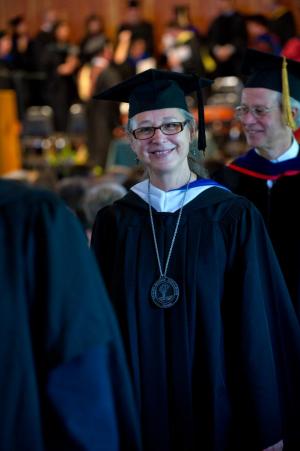 2004
2004
- Inauguration as eighth president of Marlboro College
- Bart Goodwin becomes chairman of board
2005
- Marlboro ranked #1 by Princeton Review for “Professors Bring Material to Life”
- Jerome I. Aron Fund established to support student-faculty collaboration
- Ellen works with community to articulate Four Goals to Guide Marlboro
- Dedication of Serkin Center for the Performing Arts
- Chris Lovell starts Community Trails Day to maintain OP trails
2006
- Dedication of Gib Taylor metalworking studio
- Center for Creative Solutions established to respond to community planning needs
2007
- Marlboro MBA in Managing for Sustainability launched
- 60th Anniversary Fund for Inspired Teaching created
2008
- Grand opening of Total Health Center
- Bridges orientation programs for new students established
- Dedication of Gander Center for World Studies
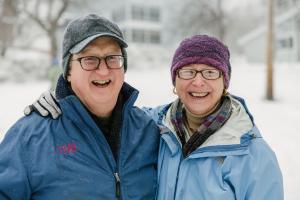 2009
2009
- Marlboro rides out economic storm
- College launches energy efficiency measures with U.S. Department of Energy grant
2010
- Task Force on the Future makes recommendations
- First alumnus board chair, Dean Nicyper ‘76
- Graduate school launches program in nonprofit management
2011
- Center of campus upgraded with walking paths and stone walls
- Marlboro rises to challenge of Tropical Storm Irene
- Global opportunities supported by Christian A. Johnson Endeavor Foundation
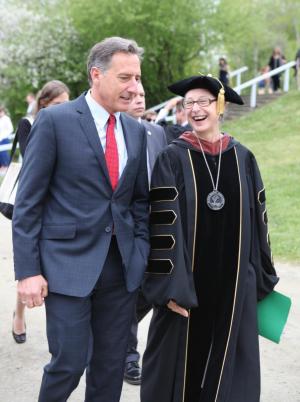 Marlboro offers dual degree programs through graduate school
Marlboro offers dual degree programs through graduate school- Summer programs for high school students launched
- Margaret A. Cargill Foundation grant supports environmental initiatives
2012
- Movies from Marlboro launched
- Community greenhouse grand opening
2013
- Beautiful Minds Challenge established
2014
- Strategic Plan for Marlboro’s future approved by trustees
- Snyder Center for the Visual Arts groundbreaking
- Cottages renovated with Marlboro Music School
John Rush animates economics
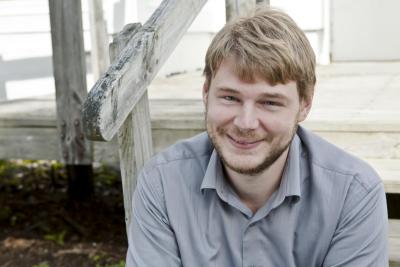 “I wanted to be somewhere where teaching would be valued, and to really have the opportunity to know my students,” says John Rush, a professor of economics who joined the Marlboro faculty in August. Before coming to Marlboro, John taught at the University of Hawaii, where he had more than a hundred students in one class and found it hard to make a significant connection with them. He is excited to be at Marlboro, which he considers “an ideal place to be a teacher and to work with students.”
“I wanted to be somewhere where teaching would be valued, and to really have the opportunity to know my students,” says John Rush, a professor of economics who joined the Marlboro faculty in August. Before coming to Marlboro, John taught at the University of Hawaii, where he had more than a hundred students in one class and found it hard to make a significant connection with them. He is excited to be at Marlboro, which he considers “an ideal place to be a teacher and to work with students.”
John grew up in northern California and received his bachelor’s degree in economics and a master’s in management from Whitworth University, in Spokane, Washington. He then went on to get his M.A. and Ph.D. in economics at the University of Hawaii at Manoa, where he researched the influence of natural disasters on poverty and inequality in developing countries.
“I have a lot of interests,” says John. “My research up to now has been focused on natural disasters and how they affect economic development, but I’ve also been really interested in the history of economic thought, learning more about the originators of the big ideas we use in economics. Gold rushes are something I’ve studied a little bit about and find really interesting to look at from an economic perspective.” He also wants to further explore the philosophical concept of “weakness of will,” a subject he finds very relevant to the foundations of economic theory.
John finds that his research helps inform his teaching in many ways, whether that’s using natural disasters to help illustrate economic ideas in a vivid and accessible way, or reading broadly to explore new connections with other disciplines. He has taught economics at the University of Hawaii, Kapiolani Community College, and LCC International University in Lithuania, but finds Marlboro especially conducive to his interdisciplinary leanings.
“One of the things I like about Marlboro is that I can read things that I wouldn’t necessarily be justified in reading for my job at other places,” he says. “There are many kinds of questions related to economics that have to do with assumptions and individual choice. At Marlboro I am free to explore these ideas without having to lay out a clear research agenda, and I think it helps my teaching. I am more informed about things that are interesting to me and important for students to think about.”
John taught two classes last fall, International Economics and Economics: Principles and Problems, the latter of which included Robinson Crusoe on the reading list. Although he asserts that economists have used Daniel Defoe’s classic to illustrate certain principles for centuries, it is less common to include the novel in an economics class, as he does. In his class on economic development he includes Mark Twain’s Connecticut Yankee in King Arthur’s Court. “That one was more my own idea,” he says. “I think it is a really excellent novel in terms of development and ethics.”
John cites Scottish philosopher Adam Smith as one of the authors that has most influenced his thoughts, not only his famous Wealth of Nations, but also The Theory of Moral Sentiments. “This much smaller book gives you a good background and understanding of where Adam Smith is coming from, in terms of what he believes about people and about the nature of human beings. It provides an interesting context to his other economics work.”
He is excited about building on the economics curriculum at Marlboro, so ably guided by retired professor Jim Tober since its inception. For John it is an opportunity to think about economics in a different way, in a broader and more interdisciplinary context, and to create a program that is responsive to the interests of students. He finds the small classes and close collaborative relationships with students at Marlboro a huge advantage in this regard.
“You can tailor classes if students are interested in a particular thing—when it’s a huge class it’s harder to do that because everyone is interested in a lot of different things,” he says. “Also, I can keep better track of my students—I can notice early on if someone is struggling. It’s much easier to be proactive if you have a relationship with students.” In economic terms, which are only fitting, John finds that Marlboro’s faculty-student ratio has a direct impact on the “marginal product.” “The quality of economic knowledge I can produce per student in a small class is larger than what I could produce for a student in a large class.”
Watch the next Potash Hill for a profile of Jean O’Hara, a new faculty member in theater who joins us on campus this spring semester.
EEI brings environmental leadership on the road
“Marlboro College has remarkable and deep roots in Vermont,” says Kyhl Lyndgaard, professor of writing and director of environmental studies at Marlboro. “But to paraphrase nature writer John Daniel, we can also say words in favor of rootlessness, at least in the form of a semester on a bus.”
Kyhl was referring to Marlboro’s new partnership with the Expedition Education Institute (EEI) to adopt innovative, bus-based programs pioneered by EEI into Semester at Marlboro offerings. Together, the two organizations will provide an undergraduate and gap-year pilot semester in the fall of 2015, and are in discussion about the possible launch of a new Master of Arts in Teaching for Ecological Education and Leadership.
EEI comes from more than 40 years of higher education rooted in direct experience, independent learning, and immersion in the natural world, as practiced by the former Audubon Expedition Institute. Participants live and learn together in an experiential learning community, traveling in a custom-retrofitted school bus. Students and faculty eat, sleep, and study outdoors within a specific bioregion as they explore local and global environmental challenges faced by communities and ecosystems.
“EEI is entirely field based but still interdisciplinary, which is a hallmark of environmental studies at Marlboro,” says Kyhl, who points out that with many alumni common to EEI and Marlboro, the fit was clear even before the partnership became official. “EEI allows for the experiential and self-directed learning that has long been central to the Marlboro model, but is mobile.”
The fall 2015 semester will take place in the Adirondacks and Appalachia, with a focus on energy and climate justice, and will be open to gap-year students, Marlboro College students, and visiting undergraduate students from other institutions. Spring 2016 will find the bus in the southeastern states, with a focus on sustainable food and farming. For more information, go to: marlboro.edu/getonthebus.
College digs in for new arts space
A lively crowd gathered at the ceremonial groundbreaking for the college’s new Snyder Center for the Visual Arts, a 14,000-square-foot building that will be built adjacent to existing visual arts buildings. The groundbreaking and reception on December 5 kicked off a full weekend Winter Arts Festival that included open studios, demonstrations, dance recitals, a play, and a chamber music concert.
A quarter of all Marlboro students include visual arts as part of their Plan of Concentration. The goal of the visual arts center is to make classroom and studio spaces more integrated and healthy, and to allow for a more flexible pedagogy that integrates other disciplines.
“This arts facility will provide a new creative space for all, and will welcome faculty in other disciplines to use it, hold classes, display work, and collaborate with faculty in the arts,” says President Ellen McCulloch-Lovell. “It will support the college’s mission of intellectual and artistic creativity.”
The new building will provide a more concentrated space for the ceramics program, which is now spread between two buildings, and a digital media lab, which is currently housed in the library. By its 2015 completion, the visual arts center will also include classrooms, a gallery space, student studios, a sculpture studio, and a welding area.
Also of Note
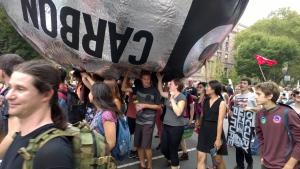 “Experience showed that serious art-making and reflection on those processes engaged students, gave teachers new tools, transferred interest from one subject to another, enlivened the school day, and kept students in school,” said President Ellen McCulloch-Lovell. Ellen gave the keynote address at a summit titled “Envisioning Arts Education in Vermont,” hosted by the Vermont Arts Council (VAC) in September. Ellen related some of her own experiences proposing and promoting arts policy in Vermont and nationally, including founding the Governor’s Institutes, which began with the arts, and directing President Clinton’s Committee on the Arts and the Humanities.
“Experience showed that serious art-making and reflection on those processes engaged students, gave teachers new tools, transferred interest from one subject to another, enlivened the school day, and kept students in school,” said President Ellen McCulloch-Lovell. Ellen gave the keynote address at a summit titled “Envisioning Arts Education in Vermont,” hosted by the Vermont Arts Council (VAC) in September. Ellen related some of her own experiences proposing and promoting arts policy in Vermont and nationally, including founding the Governor’s Institutes, which began with the arts, and directing President Clinton’s Committee on the Arts and the Humanities.
Junior Edward Suprenant spent the summer in Nepal studying Buddhist philosophy at the Rangjung Yeshe Institute, through a partnership between Kathmandu University and the Tulku Urgyen monastery. “The focus of my stay was to hopefully loosen any myopic conceptions of Buddhism I may have gained through my previous studies,” says Edward, who studied Zen Buddhism at a monastery in San Francisco. “I got exposed to a lot of South Asian cultural aspects I wasn’t aware of. Being in that environment and studying the things that come from that social environment was really cool.”
 “In the workplace, love can exist with those who are willing to lay aside ego, let their guard down, and explore their struggles together,” says Jodi Clark ’95, former director of housing. “With extra wisdom and trust brought to a particular problem, they may also discover that a powerful resource for fueling their work is their love and care for each other.” Jodi was the subject of a blog on JustMeans.com by Julie Fahnestock MBA ’14, titled “Is Love in the Workplace the New Norm?” .
“In the workplace, love can exist with those who are willing to lay aside ego, let their guard down, and explore their struggles together,” says Jodi Clark ’95, former director of housing. “With extra wisdom and trust brought to a particular problem, they may also discover that a powerful resource for fueling their work is their love and care for each other.” Jodi was the subject of a blog on JustMeans.com by Julie Fahnestock MBA ’14, titled “Is Love in the Workplace the New Norm?” .
Photography student Julian Harris ’14 had photos published in Living on Earth, Public Radio International’s environmental news magazine, in October. His striking images of traditional tanneries in Morocco were the result of a research project he did there during a program through the School for International Training (SIT), in collaboration with a fellow SIT student. The article focuses on the toxic chemicals used in traditional tanneries, which can result in serious health and environmental problems.
Hillary Boone MSM-MDO ’14, nonprofit programs communications coordinator, joined fellow Vermonters Senator Diane Snelling and Scott Johnson of the Lamoille Family Center at the RBA Africa Summit, held in Johannesburg, South Africa, in October. There, Hillary presented a session titled “Lessons Learned in Large Scale RBA (results-based accountability) Roll-out and Implementation.” In addition to handling communication for nonprofit programs at Marlboro, Hillary is program manager and RBA coach for Benchmarks for a Better Vermont, a federally funded initiative to integrate performance measurement systems in Vermont nonprofits.
 Claire Maleney ’15 (right) spent last spring semester in Switzerland, where she was studying with a School for International Training program titled International Studies and Multilateral Diplomacy. She focused on the International Criminal Court, but the highlight for her was traveling around Europe afterwards. “In many ways I think it has given me a clearer perspective on international relations,” she says, “and certainly a better understanding of how the history I’ve learned about plays out today.”
Claire Maleney ’15 (right) spent last spring semester in Switzerland, where she was studying with a School for International Training program titled International Studies and Multilateral Diplomacy. She focused on the International Criminal Court, but the highlight for her was traveling around Europe afterwards. “In many ways I think it has given me a clearer perspective on international relations,” she says, “and certainly a better understanding of how the history I’ve learned about plays out today.”
Events
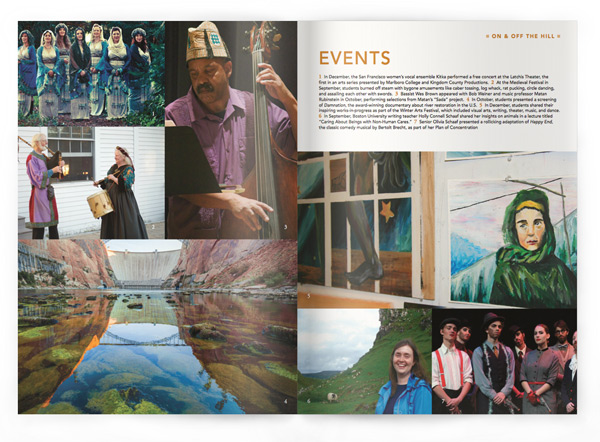
1 In December, the San Francisco women’s vocal ensemble Kitka performed a free concert at the Latchis Theater, the first in an arts series presented by Marlboro College and Kingdom County Productions. 2 At the Medieval Festival in September, students burned off steam with bygone amusements like caber tossing, log whack, rat pucking, circle dancing, and assailing each other with swords. 3 Bassist Wes Brown appeared with Bob Weiner and music professor Matan Rubinstein in October, performing selections from Matan’s “Sada” project. 4 In October, students presented a screening of Damnation, the award-winning documentary about river restoration in the U.S. 5 In December, students shared their inspiring works-in-progress as part of the Winter Arts Festival, which included visual arts, writing, theater, music, and dance. 6 In September, Boston University writing teacher Holly Connell Schaaf shared her insights on animals in a lecture titled “Caring About Beings with Non-Human Cares.” 7 Senior Olivia Schaaf presented a rollicking adaptation of Happy End, the classic comedy musical by Bertolt Brecht, as part of her Plan of Concentration
Focus on Faculty
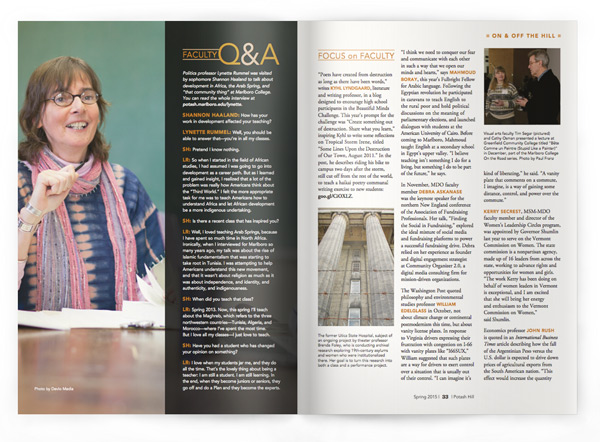
Faculty Q&A
Politics professor Lynette Rummel was visited by sophomore Shannon Haaland to talk about development in Africa, the Arab Spring, and “that community thing” at Marlboro College. You can read the whole interview.
Shannon Haaland: How has your work in development affected your teaching?
Lynette Rummel: Well, you should be able to answer that—you’re in all my classes.
SH: Pretend I know nothing.
LR: So when I started in the field of African studies, I had assumed I was going to go into development as a career path. But as I learned and gained insight, I realized that a lot of the problem was really how Americans think about the “Third World.” I felt the more appropriate task for me was to teach Americans how to understand Africa and let African development be a more indigenous undertaking.
SH: Is there a recent class that has inspired you?
LR: Well, I loved teaching Arab Springs, because I have spent so much time in North Africa. Ironically, when I interviewed for Marlboro so many years ago, my talk was about the rise of Islamic fundamentalism that was starting to take root in Tunisia. I was attempting to help Americans understand this new movement, and that it wasn’t about religion as much as it was about independence, and identity, and authenticity, and indigenousness.
SH: When did you teach that class?
LR: Spring 2013. Now, this spring I’ll teach about the Maghreb, which refers to the three northwestern countries—Tunisia, Algeria, and Morocco—where I’ve spent the most time. But I love all my classes—I just love to teach.
SH: Have you had a student who has changed your opinion on something?
LR: I love when my students jar me, and they do all the time. That’s the lovely thing about being a teacher: I am still a student. I am still learning. In the end, when they become juniors or seniors, they go off and do a Plan and they become the experts.
Focus on Faculty
“Poets have created from destruction as long as there have been words,” writes Kyhl Lyndgaard, literature and writing professor, in a blog designed to encourage high school participants in the Beautiful Minds Challenge. This year’s prompt for the challenge was “Create something out of destruction. Share what you learn,” inspiring Kyhl to write some reflections on Tropical Storm Irene, titled “Some Lines Upon the Destruction of Our Town, August 2011.” In the post, he describes riding his bike to campus two days after the storm, still cut off from the rest of the world, to teach a haikai poetry communal writing exercise to new students.
“I think we need to conquer our fear and communicate with each other in such a way that we open our minds and hearts,” says Mahmoud Boray, this year’s Fulbright Fellow for Arabic language. Following the Egyptian revolution he participated in caravans to teach English to the rural poor and hold political discussions on the meaning of parliamentary elections, and launched dialogues with students at the American University of Cairo. Before coming to Marlboro, Mahmoud taught English at a secondary school in Egypt’s upper valley. “I believe teaching isn’t something I do for a living, but something I do to be part of the future,” he says.
In November, MDO faculty member Debra Askanase was the keynote speaker for the northern New England conference of the Association of Fundraising Professionals. Her talk, “Finding the Social in Fundraising,” explored the ideal mixture of social media and fundraising platforms to power a successful fundraising drive. Debra relied on her experience as founder and digital engagement strategist at Community Organizer 2.0, a digital media consulting firm for mission-driven organizations.
 The Washington Post quoted philosophy and environmental studies professor William Edelglass in October, not about climate change or continental postmodernism this time, but about vanity license plates. In response to Virginia drivers expressing their frustration with congestion on I-66 with vanity plates like “I66SUX,” William suggested that such plates are a way for drivers to exert control over a situation that is usually out of their control. “I can imagine it’s kind of liberating,” he said. “A vanity plate that comments on a commute, I imagine, is a way of gaining some distance, control, and power over the commute.”
The Washington Post quoted philosophy and environmental studies professor William Edelglass in October, not about climate change or continental postmodernism this time, but about vanity license plates. In response to Virginia drivers expressing their frustration with congestion on I-66 with vanity plates like “I66SUX,” William suggested that such plates are a way for drivers to exert control over a situation that is usually out of their control. “I can imagine it’s kind of liberating,” he said. “A vanity plate that comments on a commute, I imagine, is a way of gaining some distance, control, and power over the commute.”
Kerry Secrest, MSM-MDO faculty member and director of the Women’s Leadership Circles program, was appointed by Governor Shumlin last year to serve on the Vermont Commission on Women. The state commission is a nonpartisan agency, made up of 16 leaders from across the state, working to advance rights and opportunities for women and girls. “The work Kerry has been doing on behalf of women leaders in Vermont is exceptional, and I am excited that she will bring her energy and enthusiasm to the Vermont Commission on Women,” said Shumlin.
Economics professor John Rush, is quoted in an International Business Times article describing how the fall of the Argentinian Peso versus the U.S. dollar is expected to drive down prices of agricultural exports from the South American nation. “This effect would increase the quantity of Argentine agricultural products demanded in the United States, benefiting agricultural exporters in Argentina,” says John. According to the article, the lower price for Argentine agricultural products in the global market could prove to be a boon for the nation’s farmers, ranchers, and other exporters.
Spanish language and literature professor Rosario de Swanson's poetry was featured in a recent anthology on immigration and borderlands titled Déjame que te cuente…, Volume III, Bilingual Edition. The volume was published in 2014 by Chiringa Press, in Seguin, Texas. “My work includes selections from a collection titled De canciones de amor y otras penas, and within this a poem about crisis on the border simply titled “Plegaria a la humanidad,” or “Plea to humanity.”
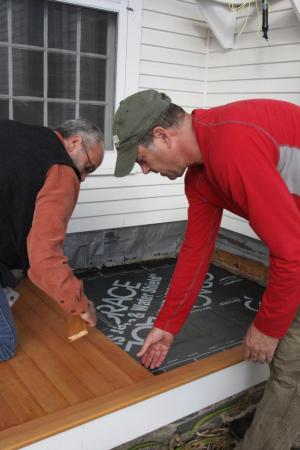 “Maybe once we accept that colleges cannot out-perform the criminal justice system, permission will be granted to try something that actually draws on our strengths,” wrote politics professor Meg Mott in the Washington Post in July. In response to new legislation aimed at curbing sexual assaults on college campuses by forcing colleges to be more accountable in their disciplinary proceedings, Meg argued that many cases would be better served by mediation. “We are so much better at creating the conditions where young people can learn from their mistakes than pretending we can fight crime like the professionals,” she wrote: goo.gl/0GsRvJ.
“Maybe once we accept that colleges cannot out-perform the criminal justice system, permission will be granted to try something that actually draws on our strengths,” wrote politics professor Meg Mott in the Washington Post in July. In response to new legislation aimed at curbing sexual assaults on college campuses by forcing colleges to be more accountable in their disciplinary proceedings, Meg argued that many cases would be better served by mediation. “We are so much better at creating the conditions where young people can learn from their mistakes than pretending we can fight crime like the professionals,” she wrote: goo.gl/0GsRvJ.
Marlboro College was pleased to present the world premier of Vermont Headstones, a set of songs for oboe, viola, and baritone composed by music professor Stan Charkey, as part of the Music for a Sunday Afternoon series in November. The new work was based on headstone inscriptions found in cemeteries throughout Vermont, from Marlboro to Mt. Holly, from the 18th and early 19th centuries. Vermont Headstones was performed by three colleagues from the University of Maryland School of Music, Daren Jackson (baritone), Mark Hill (oboe), and Katherine Murdock (viola).
“TV series are increasingly challenging the dominant position of feature-length film in Africa,” writes French language professor Boukary Sawadogo in the Canadian film journal CineAction. In an article titled “Are Sitcoms the Future of Francophone West African Cinema?” Boukary examines the changing landscape of West African films in light of the ever-growing production, popularity, and accessibility of locally produced TV series. “Sitcoms are creating a new dynamic in African cinemas, with regard to accessibility and delivery that are enhanced and democratized by the development of digital technologies,” he writes.
In September, MSM-MDO Program Chair Kate Jellema and Hillary Boone, nonprofit programs communications coordinator, led sessions at the annual conference of the Alliance for Nonprofit Management, in Austin, Texas. “We came back invigorated by new ideas, but also excited about Vermont’s leadership in fields like results-based accountability, learning communities, and personal leadership development,” says Kate.
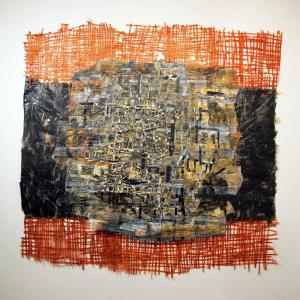 In January, film professor Jay Craven presented a panel discussion in New York titled “Outside Manhattan: John Dewey’s Case for Intensive Learning and Cultural Cinema,” the latest in the Marlboro College On the Road series. He was joined by alumni Jesse Nesser ’13 and Amanda Wilder ’07, both accomplished filmmakers, in an informal talk at one of New York’s premier performance venues, The Cutting Room, owned by Marlboro alumnus Chris Noth. Jay shared anecdotes from his experiences with the Movies from Marlboro program, demonstrating John Dewey’s call for “intensive learning that enlarges meaning through the shared experience of joint action.”
In January, film professor Jay Craven presented a panel discussion in New York titled “Outside Manhattan: John Dewey’s Case for Intensive Learning and Cultural Cinema,” the latest in the Marlboro College On the Road series. He was joined by alumni Jesse Nesser ’13 and Amanda Wilder ’07, both accomplished filmmakers, in an informal talk at one of New York’s premier performance venues, The Cutting Room, owned by Marlboro alumnus Chris Noth. Jay shared anecdotes from his experiences with the Movies from Marlboro program, demonstrating John Dewey’s call for “intensive learning that enlarges meaning through the shared experience of joint action.”
In August, visual arts faculty member Cathy Osman was awarded a Vermont Arts Council “creation grant” to support the creation of a body of work addressing the multifaceted relationship between the U.S. and Cambodia. Cathy has helped lead service-learning trips to Cambodia three times in the last five years, and her recent collage-based work suggests the impact of modernization and the English-speaking world upon the Southeast Asian nation. “This new body of work will continue to reflect on my relationship to my service work in Cambodia and what it means to engage in a culture that is dramatically modernizing, debilitatingly poor, historically scarred, yet resilient,” says Cathy.
“Unlike any other system for assessing the sustainability performance of a company, the MultiCapital Scorecard (MCS) makes it possible to answer the questions all organizations should be asking of themselves,” says Mark McElroy, Marlboro MBA faculty. The MCS method, developed by Thomas & McElroy, a company co-founded by Mark, was recently chosen by Ben & Jerry’s to measure the impact of their sustainability and social mission programs. Mark presented the pilot case with Rob Michalak, Ben & Jerry’s global director of social mission, at the New Metrics ’14 conference at MIT in September.
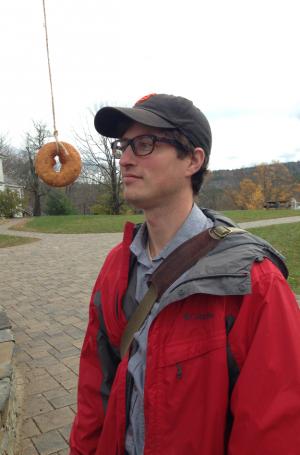 In August, Caleb Clark, faculty and chair of the MA in Teaching with Technology program, led an “E-Textiles” workshop for kids at the Bennington Free Library. An engaged group of 18 kids learned how to add blinking lights to anything they sew, using conductive thread, a battery holder, some small LED bulbs, and what Caleb referred to as a “twinkle chip.” “Believe it or not, this is engineering,” said Caleb, explaining that the workshop was intended to attract both girls and boys to the field. The program was made possible by funding from the Vermont Community Foundation Innovations and Collaborations grant: .
In August, Caleb Clark, faculty and chair of the MA in Teaching with Technology program, led an “E-Textiles” workshop for kids at the Bennington Free Library. An engaged group of 18 kids learned how to add blinking lights to anything they sew, using conductive thread, a battery holder, some small LED bulbs, and what Caleb referred to as a “twinkle chip.” “Believe it or not, this is engineering,” said Caleb, explaining that the workshop was intended to attract both girls and boys to the field. The program was made possible by funding from the Vermont Community Foundation Innovations and Collaborations grant: .
Last summer, math professor Matt Ollis worked with Gage Martin ’15 on several research projects supported by a faculty professional development grant and a Town Meeting scholarship. Their work resulted in a co-authored paper submitted to the Australasian Journal of Combinatorics, titled “R-sequencings and strong half-cycles from narcissistic terraces.” As you surely know already, R-sequencings and strong half-cycles are used to solve problems in several subfields of math such as graph embedding, graph decomposition, and design theory. The paper builds on work from an earlier paper co-authored by Matt and Devin Willmott ’11.
2014 Graduate Commencement
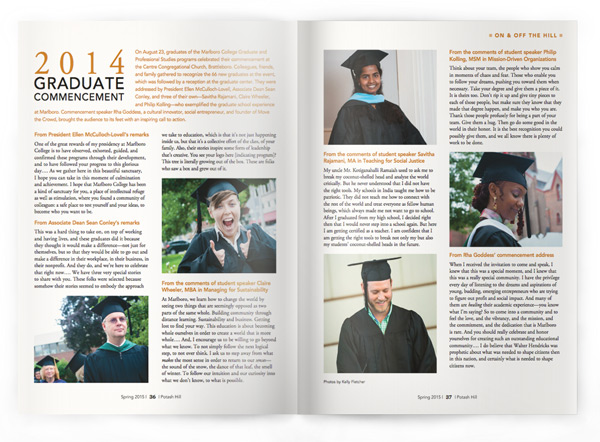
On August 23, graduates of the Marlboro College Graduate and Professional Studies programs celebrated their commencement at the Centre Congregational Church, Brattleboro. Colleagues, friends, and family gathered to recognize the 66 new graduates at the event, which was followed by a reception at the graduate center. They were addressed by President Ellen McCulloch-Lovell, Associate Dean Sean Conley, and three of their own—Savitha Rajamani, Claire Wheeler, and Philip Kolling—who exemplified the graduate school experience at Marlboro. Commencement speaker Rha Goddess, a cultural innovator, social entrepreneur, and founder of Move the Crowd, brought the audience to its feet with an inspiring call to action.
From President Ellen McCulloch-Lovell’s remarks
One of the great rewards of my presidency at Marlboro College is to have observed, exhorted, guided, and confirmed these programs through their development, and to have followed your progress to this glorious day…. As we gather here in this beautiful sanctuary, I hope you can take in this moment of culmination and achievement. I hope that Marlboro College has been a kind of sanctuary for you, a place of intellectual refuge as well as stimulation, where you found a community of colleagues: a safe place to test yourself and your ideas, to become who you want to be.
From Associate Dean Sean Conley’s remarks 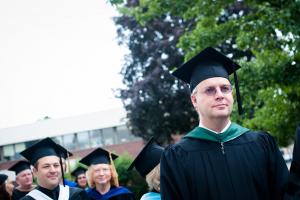 This was a hard thing to take on, on top of working and having lives, and these graduates did it because they thought it would make a difference—not just for themselves, but so that they would be able to go out and make a difference in their workplace, in their business, in their nonprofit. And they do, and we’re here to celebrate that right now…. We have three very special stories to share with you. These folks were selected because somehow their stories seemed to embody the approach we take to education, which is that it’s not just happening inside us, but that it’s a collective effort of the class, of your family. Also, their stories inspire some form of leadership that’s creative. You see your logo here [indicating program]? This tree is literally growing out of the box. These are folks who saw a box and grew out of it.
This was a hard thing to take on, on top of working and having lives, and these graduates did it because they thought it would make a difference—not just for themselves, but so that they would be able to go out and make a difference in their workplace, in their business, in their nonprofit. And they do, and we’re here to celebrate that right now…. We have three very special stories to share with you. These folks were selected because somehow their stories seemed to embody the approach we take to education, which is that it’s not just happening inside us, but that it’s a collective effort of the class, of your family. Also, their stories inspire some form of leadership that’s creative. You see your logo here [indicating program]? This tree is literally growing out of the box. These are folks who saw a box and grew out of it.
From the comments of student speaker Claire Wheeler, MBA in Managing for Sustainability At Marlboro, we learn how to change the world by seeing two things that are seemingly opposed as two parts of the same whole. Building community through distance learning. Sustainability and business. Getting lost to find your way. This education is about becoming whole ourselves in order to create a world that is more whole…. And, I encourage us to be willing to go beyond what we know. To not simply follow the next logical step, to not over think. I ask us to step away from what makes the most sense in order to return to our senses— the sound of the snow, the dance of that leaf, the smell of winter. To follow our intuition and our curiosity into what we don’t know, to what is possible.
At Marlboro, we learn how to change the world by seeing two things that are seemingly opposed as two parts of the same whole. Building community through distance learning. Sustainability and business. Getting lost to find your way. This education is about becoming whole ourselves in order to create a world that is more whole…. And, I encourage us to be willing to go beyond what we know. To not simply follow the next logical step, to not over think. I ask us to step away from what makes the most sense in order to return to our senses— the sound of the snow, the dance of that leaf, the smell of winter. To follow our intuition and our curiosity into what we don’t know, to what is possible.
From the comments of student speaker Savitha Rajamani, MA in Teaching for Social Justice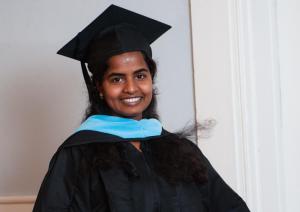 My uncle Mr. Kotiganahalli Ramaiah used to ask me to break my coconut-shelled head and analyze the world critically. But he never understood that I did not have the right tools. My schools in India taught me how to be patriotic. They did not teach me how to connect with the rest of the world and treat everyone as fellow human beings, which always made me not want to go to school. After I graduated from my high school, I decided right then that I would never step into a school again. But here I am getting certified as a teacher. I am confident that I am getting the right tools to break not only my but also my students’ coconut-shelled heads in the future.
My uncle Mr. Kotiganahalli Ramaiah used to ask me to break my coconut-shelled head and analyze the world critically. But he never understood that I did not have the right tools. My schools in India taught me how to be patriotic. They did not teach me how to connect with the rest of the world and treat everyone as fellow human beings, which always made me not want to go to school. After I graduated from my high school, I decided right then that I would never step into a school again. But here I am getting certified as a teacher. I am confident that I am getting the right tools to break not only my but also my students’ coconut-shelled heads in the future.
From the comments of student speaker Philip Kolling, MSM in Mission-Driven Organizations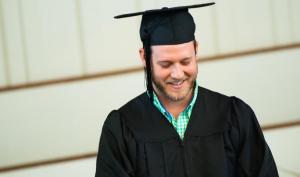 Think about your team, the people who show you calm in moments of chaos and fear. Those who enable you to follow your dreams, pushing you toward them when necessary. Take your degree and give them a piece of it. It is theirs too. Don’t rip it up and give tiny pieces to each of those people, but make sure they know that they made that degree happen, and make you who you are. Thank those people profusely for being a part of your team. Give them a hug. Then go do some good in the world in their honor. It is the best recognition you could possibly give them, and we all know there is plenty of work to be done.
Think about your team, the people who show you calm in moments of chaos and fear. Those who enable you to follow your dreams, pushing you toward them when necessary. Take your degree and give them a piece of it. It is theirs too. Don’t rip it up and give tiny pieces to each of those people, but make sure they know that they made that degree happen, and make you who you are. Thank those people profusely for being a part of your team. Give them a hug. Then go do some good in the world in their honor. It is the best recognition you could possibly give them, and we all know there is plenty of work to be done.
From Rha Goddess’ commencement address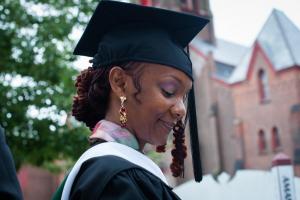 When I received the invitation to come and speak, I knew that this was a special moment, and I knew that this was a really special community. I have the privilege every day of listening to the dreams and aspirations of young, budding, emerging entrepreneurs who are trying to figure out profit and social impact. And many of them are healing their academic experience—you know what I’m saying? So to come into a community and to feel the love, and the vibrancy, and the mission, and the commitment, and the dedication that is Marlboro is rare. And you should really celebrate and honor yourselves for creating such an outstanding educational community…. I do believe that Walter Hendricks was prophetic about what was needed to shape citizens then in this nation, and certainly what is needed to shape citizens now.
When I received the invitation to come and speak, I knew that this was a special moment, and I knew that this was a really special community. I have the privilege every day of listening to the dreams and aspirations of young, budding, emerging entrepreneurs who are trying to figure out profit and social impact. And many of them are healing their academic experience—you know what I’m saying? So to come into a community and to feel the love, and the vibrancy, and the mission, and the commitment, and the dedication that is Marlboro is rare. And you should really celebrate and honor yourselves for creating such an outstanding educational community…. I do believe that Walter Hendricks was prophetic about what was needed to shape citizens then in this nation, and certainly what is needed to shape citizens now.